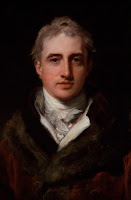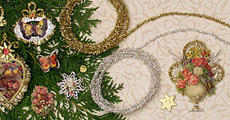by M.M. Bennetts
Imagine it! For over twenty years, Great Britain had been cut off from Continental travel and culture. And when I say cut off, I mean, cut off.
War is always bad for international trade and social and cultural intercourse. And since 1793, the Continent had been embroiled in a series of wars, first with the newly formed French Republic and subsequently with Napoleonic France.
Then, with the imposition of the Berlin Decrees in November 1806 and the 1807 Milan Decrees, the French Emperor had effectively severed all commercial ties between the Continent and Great Britain. If things hadn't been difficult enough, now it was impossible (unless you were a smuggler, and in that case, business began to boom...)
Hence British merchants, travelers, scientists and diplomats (and their wives) had had to find other markets, other places to do business, other cities to visit and enjoy, other more exotic lands to investigate. Books, music and ideas had perhaps continued to be exchanged between the Continent and Britain--a bit--but only because these could easily be sent or smuggled without damage.
And then, finally, in 1814, came peace. The holiday-abroad-starved Brits (who had become quite insular over the past two decades) flocked to the Continent and especially to Vienna in the autumn of 1814, where the great European Congress, the first ever international peace conference, was being held.
 Great Britain's Foreign Secretary, Viscount Castlereagh arrived with his wife and brother in tow and a diplomatic mission of some 80 others. There were fourteen assistants, including Lord Cathcart and Lord Clancarty, Edward Cooke, the undersecretary of state, and Joseph Planta, Castlereagh's private secretary.
Great Britain's Foreign Secretary, Viscount Castlereagh arrived with his wife and brother in tow and a diplomatic mission of some 80 others. There were fourteen assistants, including Lord Cathcart and Lord Clancarty, Edward Cooke, the undersecretary of state, and Joseph Planta, Castlereagh's private secretary.
The parties and balls that autumn were extravagant and endless as European heads of state, diplomats and their entourages, and those representing special interests such as printers and publishers, the Papal representative or the Jewish delegation engaged in a ceaseless round of business-mingling and flirtation that accomplished little. Meanwhile, the Viennese shopkeepers, wine-sellers, brothel-owners, hoteliers, gambling dens, restauranteurs, and secret service made money hand over fist.
Then, as December came to Vienna, snow began to fall occasionally, the days were shorter and colder, and the city began to celebrate Advent and prepare for Christmas. It would be the first Christmas without war in twenty years...
From the 13th century, Viennese traders had held a special December Market, the Thomasmarkt, from before Christmas through New Year, which sold wonderful gingerbread and pastries. In the Am Hof market though, the sale of this special gingerbread (a study of contemporary invoices tells us) had expanded to include Christmas goods too for the first time--angels, silver-plated nuts, ribbons, lametta (thin strips of metallic decorative work formed into stars, snowflakes and icicles, etc.) and candles--alongside the standard market fare.
Then, just before Christmas, there was a great party at the Arnstein mansion held by Fanny von Arnstein, a prominent Viennese hostess, where guests found in the salon a great, tall fir tree, decorated all over with gifts, lametta and candles. It was the first Christmas tree ever seen in Vienna, and it's referred to in the diaries of diplomats and the reports of the many spies of the Congress, as "the Berlin custom".
The many guests were enchanted.
The French embassy were among the first to adopt the custom as their own. There, the French ambassador's hostess, Dorothee, Duchesse du Perigord, convinced the ambassador to decorate the mansion Berlin-style. Nor was she content with just one tree. In the great hallway, guests were greeted with a huge fir tree, adorned with "colourful garlands and lit candles" while another even larger tree stood near the mansion's famous staircase, and everywhere too, there were platters of German-style marzipan delicacies--formed into fruits and small animals, gingerbread and butter biscuits.
And that year, when Dorothee hosted a party on Christmas Eve, gifts were exchanged that night, again, German-style--not as they did in Catholic countries like Austria and France, on New Year's Eve...
It was the start of a whole new way of celebrating Christmas. Imagine that...
Editors' Choice from the Archives: originally published December 18, 2012.
~~~~~~~~~~~~

M.M. Bennetts was one of the driving forces behind the EHFA blog and contributed many wonderful posts before her early demise some years ago. She was a specialist in early 19th century European history and the Napoleonic wars, and the author of two novels, May 1812 and Of Honest Fame set during the period.
Imagine it! For over twenty years, Great Britain had been cut off from Continental travel and culture. And when I say cut off, I mean, cut off.
War is always bad for international trade and social and cultural intercourse. And since 1793, the Continent had been embroiled in a series of wars, first with the newly formed French Republic and subsequently with Napoleonic France.
Then, with the imposition of the Berlin Decrees in November 1806 and the 1807 Milan Decrees, the French Emperor had effectively severed all commercial ties between the Continent and Great Britain. If things hadn't been difficult enough, now it was impossible (unless you were a smuggler, and in that case, business began to boom...)
Hence British merchants, travelers, scientists and diplomats (and their wives) had had to find other markets, other places to do business, other cities to visit and enjoy, other more exotic lands to investigate. Books, music and ideas had perhaps continued to be exchanged between the Continent and Britain--a bit--but only because these could easily be sent or smuggled without damage.
And then, finally, in 1814, came peace. The holiday-abroad-starved Brits (who had become quite insular over the past two decades) flocked to the Continent and especially to Vienna in the autumn of 1814, where the great European Congress, the first ever international peace conference, was being held.
 Great Britain's Foreign Secretary, Viscount Castlereagh arrived with his wife and brother in tow and a diplomatic mission of some 80 others. There were fourteen assistants, including Lord Cathcart and Lord Clancarty, Edward Cooke, the undersecretary of state, and Joseph Planta, Castlereagh's private secretary.
Great Britain's Foreign Secretary, Viscount Castlereagh arrived with his wife and brother in tow and a diplomatic mission of some 80 others. There were fourteen assistants, including Lord Cathcart and Lord Clancarty, Edward Cooke, the undersecretary of state, and Joseph Planta, Castlereagh's private secretary. The parties and balls that autumn were extravagant and endless as European heads of state, diplomats and their entourages, and those representing special interests such as printers and publishers, the Papal representative or the Jewish delegation engaged in a ceaseless round of business-mingling and flirtation that accomplished little. Meanwhile, the Viennese shopkeepers, wine-sellers, brothel-owners, hoteliers, gambling dens, restauranteurs, and secret service made money hand over fist.
Then, as December came to Vienna, snow began to fall occasionally, the days were shorter and colder, and the city began to celebrate Advent and prepare for Christmas. It would be the first Christmas without war in twenty years...
From the 13th century, Viennese traders had held a special December Market, the Thomasmarkt, from before Christmas through New Year, which sold wonderful gingerbread and pastries. In the Am Hof market though, the sale of this special gingerbread (a study of contemporary invoices tells us) had expanded to include Christmas goods too for the first time--angels, silver-plated nuts, ribbons, lametta (thin strips of metallic decorative work formed into stars, snowflakes and icicles, etc.) and candles--alongside the standard market fare.
Then, just before Christmas, there was a great party at the Arnstein mansion held by Fanny von Arnstein, a prominent Viennese hostess, where guests found in the salon a great, tall fir tree, decorated all over with gifts, lametta and candles. It was the first Christmas tree ever seen in Vienna, and it's referred to in the diaries of diplomats and the reports of the many spies of the Congress, as "the Berlin custom".
The many guests were enchanted.
The French embassy were among the first to adopt the custom as their own. There, the French ambassador's hostess, Dorothee, Duchesse du Perigord, convinced the ambassador to decorate the mansion Berlin-style. Nor was she content with just one tree. In the great hallway, guests were greeted with a huge fir tree, adorned with "colourful garlands and lit candles" while another even larger tree stood near the mansion's famous staircase, and everywhere too, there were platters of German-style marzipan delicacies--formed into fruits and small animals, gingerbread and butter biscuits.
And that year, when Dorothee hosted a party on Christmas Eve, gifts were exchanged that night, again, German-style--not as they did in Catholic countries like Austria and France, on New Year's Eve...
It was the start of a whole new way of celebrating Christmas. Imagine that...
Editors' Choice from the Archives: originally published December 18, 2012.
~~~~~~~~~~~~

M.M. Bennetts was one of the driving forces behind the EHFA blog and contributed many wonderful posts before her early demise some years ago. She was a specialist in early 19th century European history and the Napoleonic wars, and the author of two novels, May 1812 and Of Honest Fame set during the period.




You make me wish I could have been there.
ReplyDeleteWhat a great article! It is so interesting to see how customs evolved. Wouldn't have been fun to be at Fanny von Arnstein's party? Thanks, M. M.!
ReplyDeleteDelightful, and always informative.: - )
ReplyDeleteI would love to have seen the outdoor Christmas market and people's reactions to their first Christmas tree.
ReplyDeleteEnjoyed the post!
Very interesting article this is good
ReplyDeletewww.journeylankaholidays.co.uk
Thanks for the interesting article! Do you write more about Dorothee in your novels? At Museum Burg Posterstein we have been doing research on her mother, her sister and herself for 20 years now. You find more information on our website: http://www.burg-posterstein.de/home/663-2/research/?lang=en
ReplyDelete